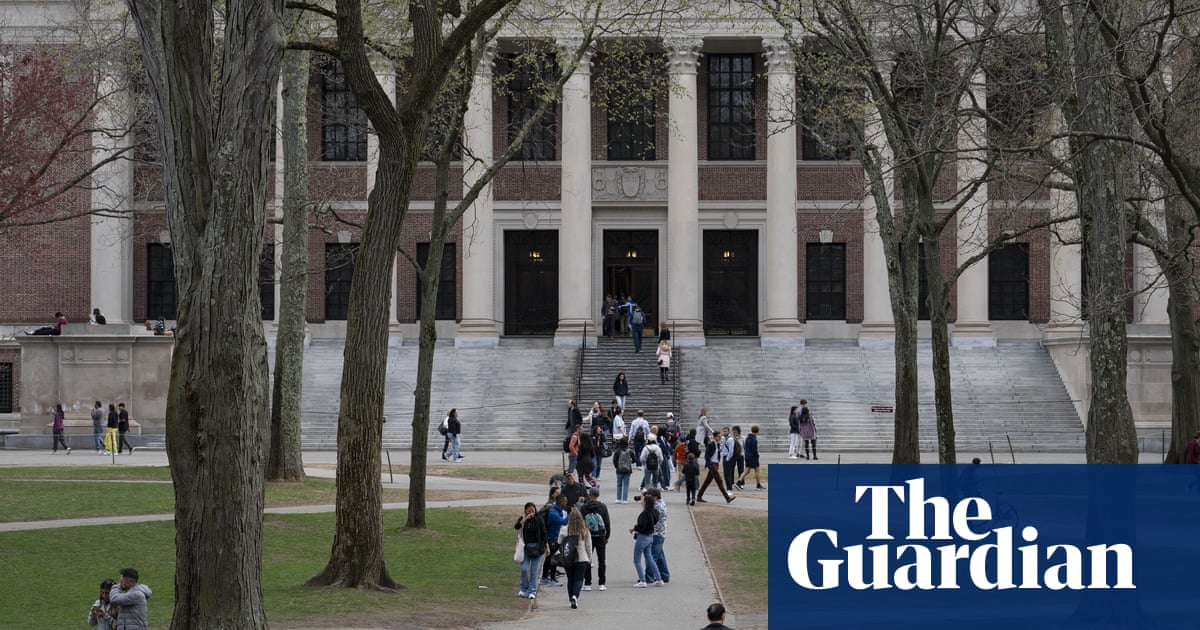Harvard’sforeign students described an atmosphere of “fear on campus” following an attempt by theTrump administrationto ban international scholars at the oldest university in the US.
On lush, grassy quads filled with tents and chairs ready for end of year graduation celebrations, international students said there was “mass panic” after Thursday’s shock announcement by the Department of Homeland Security.
The move triggered cancelled flights home for the summer, scrambles for housing to stay in the US over the break, and even swift attempts to transfer schools.
On Friday, Harvard sued for a “blatant violation” of the US constitution and Allison Burroughs, a federal judge of the district of Massachusetts, temporarily blocked the White House from revoking Harvard’s ability to enroll foreign students, who make up an estimated 27% of the student body or around 6,700 students.
Fearful of repercussions following a nationwide crackdown on academics and student protestors, including the arrest and detention of local Tufts University undergraduate,Rümeysa Öztürk, in nearby Somerville, in March, many students and staff spoke on condition of anonymity.
One 24-year-old Ukrainian freshman, who is a Harvard undergraduate during term time and returns to a war-torn country during holidays, said that she has delayed her scheduled flights next week back to her parents who are displaced in westernUkraine, unsure if she can get back into the US.
“I feel really shocked,” she said. “If I leave, I’m not sure I’ll get back in. I’m lucky, I have housing the whole summer, so if I need to stay I can. Not all my friends have that. Some people are talking about transferring to different schools, but the transfer window is basically shut now.”
She added: “Getting into Harvard is a big deal, it’s transformative, but this is outside our control. It goes against logic, but things go against logic in America right now.”
A Chinese visiting scholar from Peking University in Beijing, here for an 18-month research trip for her PhD, called the legal battle “really, really scary” and described “mass panic” among her international friends when the attempted ban was announced on Thursday.
The 28-year-old woman said: “We stayed up all night talking about our options, our plan Bs. I was going to go to the UK this summer because my professor has a position in Manchester. I’m a bit worried I won’t be able to get back in. I have to go back to Beijing to finish my PhD, but a lot of students here had longterm plans to stay in America. Harvard is like a special light in the world. If something happens to Harvard it makes me frightened.”
A Haitian Masters student, who recently graduated, said a town hall organised by the university to talk to students about their fears had a waiting list of 100 people within minutes, and a campus wide text chat “blew up with hundreds of messages in an hour”.
But she added that the strong statement by Alan Garber, Harvard’s president, and the block by the federal judge made her “hopeful”. She added: “They’ve got our back, I have to trust that they want what is best for all of us.”
Sign up toThis Week in Trumpland
A deep dive into the policies, controversies and oddities surrounding the Trump administration
after newsletter promotion
A member of admin staff, who lives on campus with international students and works to support them, added: “It’s horrific and almost certainly unlawful. There is a feeling of fear on campus. Normally, you just face typical, internal student problems but when it is the outside world coming in it is hard to know how to help them.”
She added that there was a “misunderstanding that all international students are wealthy” and can afford to have cancelled or disrupted studies. “I would say 50% of them need significant financial aid, and Harvard has a really robust system. They have already been so disrupted because of Covid. Maybe some students can transfer, but maybe they can’t afford to go. And they have lost this once in a lifetime opportunity. Poof, gone.”
Garber said in a letter to the Harvard community: “We condemn this unlawful and unwarranted action. It imperils futures of thousands of students and scholars across Harvard and serves as a warning to countless others at colleges and universities across the country who have to America to pursue their education and fulfill their dreams.”
The Guardian has contacted Harvard for comment.
